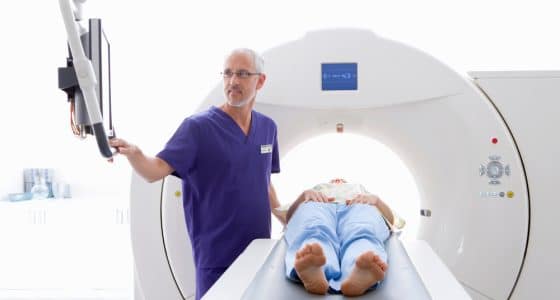Once patients have been diagnosed with malignant pleural mesothelioma, they work with their physicians to establish a treatment protocol and put a plan into action. But not every approach works as well as hoped, and success needs to constantly be checked so that it can be continued or discarded in favor of something else. Though CT scans are a common method of monitoring progress, these imaging studies have downsides, including exposure to radiation. But Italian researchers have determined that a commonly used blood test will provide the same information, reducing the need for constant scanning.

Replacing CT Scan Testing with Blood Test Eases Road for Mesothelioma Patients
When a patient is suspected of having malignant pleural mesothelioma, they submit to a series of tests, including a blood test measuring soluble mesothelin-related peptides called an SMRP, CT scans, biopsies, and lung fluid samples. Many of these tests are combined into a specific measure known as mRECIST, which is also used to gauge changes in the tumors. All of these are necessary for initial diagnosis, but once mesothelioma’s presence has been established, physicians are concerned about further testing’s expense, as well as the potential risks posed by CT scans’ radiation exposure.
The Italian researchers set out to see whether – once mesothelioma has already been established — simply testing for SMRP could replace the use of repeated mRECIST testing to monitor for changes in patients’ tumors. They conducted blinded tests of 183 SMRP test results compared to 58 mRECIST tests conducted on pleural mesothelioma patients and found a “statistically significant correlation between the two.”
Researchers Say Blood Test May Offer Way to Monitor Mesothelioma with Fewer CT Scans
Writing on their results in the journal Diagnostics, lead author Federica Grosso said, “These results, although exploratory, suggest the SMRP measurement might be considered as an adjunct to monitor pleural mesothelioma patients in order to delay CT scans time interval.” The option of using a blood test rather than requiring patients to undergo costly testing that involves risk represents a significant improvement in quality-of-life issues for patients who are already facing challenges.
If you or someone you love has been diagnosed with malignant pleural mesothelioma, top-of-the-line medical treatment is essential. For information on the resources available to you, contact the Patient Advocates at Mesothelioma.net today at 1-800-692-8608.
